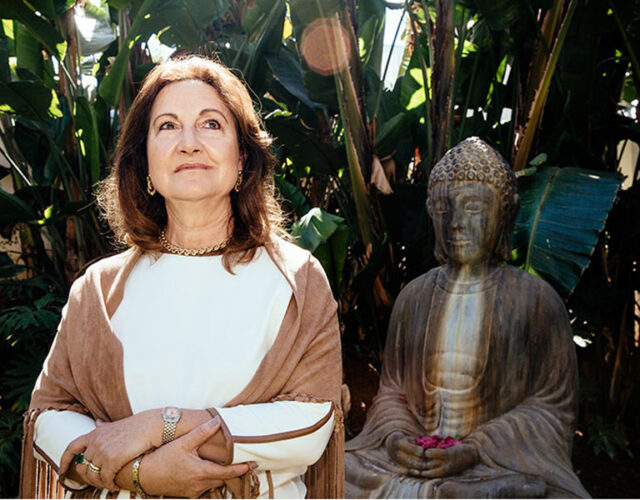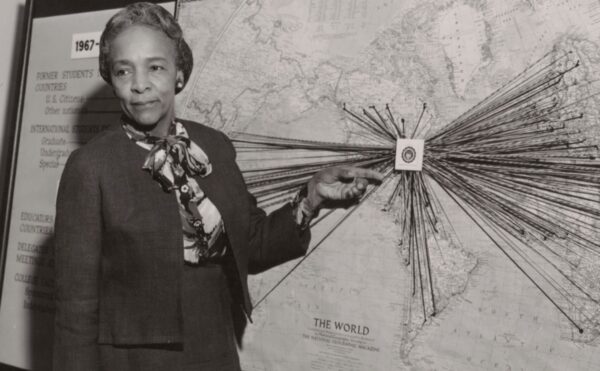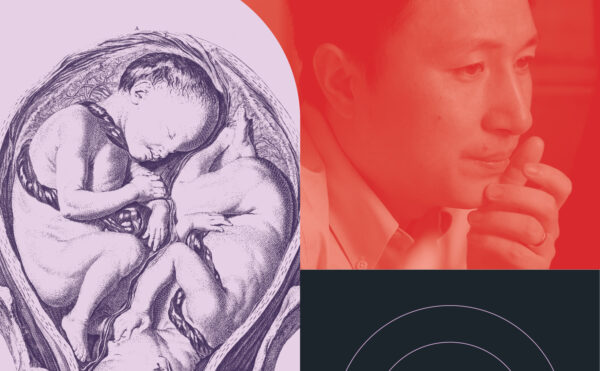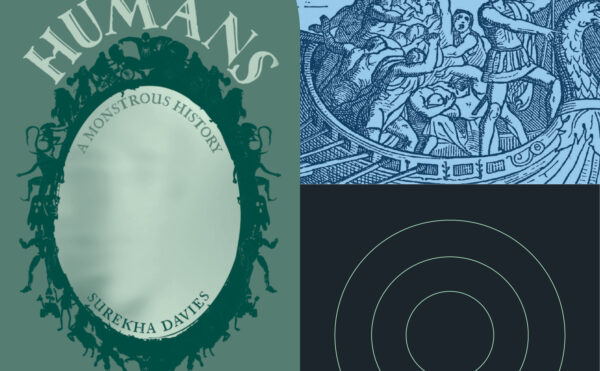Over the past few weeks, Distillations has been talking to people who have special insight into the coronavirus crisis—biomedical researchers, physicians, public health experts, and historians.
In this episode, we talk with Magda Marquet, a biochemical engineer and entrepreneur. Marquet has spent decades working on DNA vaccines, one of the many techniques being used to create a vaccine for COVID-19. She also sits on the board of Arcturus Therapeutics, which is developing a vaccine for the disease. She tells us about how a company she cofounded, AltheaDx, is taking on the mental health crisis, which has been exacerbated by the pandemic. And she discusses her hopes that the lessons learned during the pandemic might change society for the better.
Credits
Host: Lisa Berry Drago
Senior Producer: Mariel Carr
Producer: Rigoberto Hernandez
Researcher: Jessica Wade
Audio Engineer: Jonathan Pfeffer
Original music by Zach Young
Transcript
Lisa: Hello, and welcome to Distillations. I’m one of your hosts, Lisa Berry Drago. In response to the coronavirus pandemic we’ve launched a brand-new series focused entirely on COVID-19. Over the next several weeks we’ll be bringing you interviews with people working at the heart of the crisis, including biomedical researchers, physicians, and public health experts.
In this episode I talked with Magda Marquet, a biotech entrepreneur. She currently sits on the board of Arcturus Therapeutics, which is developing a vaccine for Covid-19. She tells us about how a company she co-founded is also taking on the mental health crisis, which has only been exacerbated by the pandemic. And about her hopes the pandemic will change society for the better.
Lisa: My background in art history prepared me for the kind of, um, visual culture of this moment, and the kind of, you know, you see like the scrolling banners, “Pandemic,” and stuff but-
Magda Marquet: Right.
Lisa: A lot of times, what’s being talked about some of like, you know, the vaccine creation and, and, um, replication rates and things like that I’m sometimes like, “I, I would really like an expert to walk me through this.” [laughs]
Magda Marquet: [laughing] But, you know you’re at the right place because if you think about it dur- throughout history I mean pandemics have reshaped, n- not just the economy, but the way we live. So you probably have a better perspective that scientists have, which may be a bit narrow focus. So-
Lisa: Mm.
Magda Marquet: … it’s all good. [laughs]
Lisa: Speaking of scientist would you talk a little bit about your background, um, particularly as it sort of relates to this moment?
Magda Marquet: Sure. Sure. So I, I started my career as a biochemical engineer in the early ’80s, and I started with biotechnology. So at the time it was very new and I was kind of wondering, you know, what it would be like, It’s hard to imagine what it has become. So, as you can tell with my accent, I’m not a native American. [laughs] I grew up in a, in a small country called, uh, Andorra in the Pyrenees mountains between France and Spain, I went to school in France, and went to the first biotech company in Europe called Transgene, where we were working in genetic engineering and recombinant DNA, and that was in early ’80s.
And then at some point my husband I said, “You know, if we want to be in biotech we need to go to the US,” and we were 28-years-old, we just thought it was an adventure. We quit our jobs and then we ended up in San Diego, we thought we would stay a couple of years and then go back. And it’s been over 30 years and here we are. [laughs] So, my career has been really, really riding the wave of biotech and doing, you know, first genetic engineering, then gene therapy, DNA vaccines, becoming an entrepreneur, now becoming also an investor. So I’ve been kind of looking at almost the whole picture of what biotech has been and continues to be, so it’s just a fascinating industry. And I think right now, obviously, there is a lot of, emphasis on what we can do to be part of the solution with the pandemic.
Lisa: Do you see any direct connections between some of the projects that you’ve been part of, and anything that you’re, you’re now hearing about, or?
Magda Marquet: Sure, sure. So I worked, uh, uh, many years I worked for about two decades on developing DNA vaccines. So DNA vaccines are nucleic acid vaccines and the advantage of DNA vaccines is that they can be used at much lower doses, and they can be also safe and, and easy to produce compared to conventional vaccines. So, when I was working at Vical, in the early ’90s, I developed methods to produce large quantities of DNA vaccines to inject in humans because at the time it wasn’t an obvious thing to do and we had to deal with regulatory agencies and make sure that whatever we did was safe and made sense.
So, I worked with a pioneering team in developing DNA vaccines in the early ’90s, and then when I started Althea Technologies which I started the company with my husband in ’98, we also developed processes for large-scale production of DNA vaccines. So. Yeah. All of this experience, I think, is relevant today. And today I’m also on the board of directors of a company called Arcturus Therapeutics which develop RNA vaccines. RNA is another kind of nucleic acid type of vaccine and, what we do there is very interesting.
We have, uh, data at the moment with, in, preclinical models that show, that gives us a lot of hope because it shows that we can use very small doses if we can, of course, produce that at the human scale, but the doses are very small, and also it seems to be producing a response, you know, in preclinical models, an immunological response. So all of that gives us a lot of hope.
And to give you an idea I mean right now the pandemic obviously is global problem. We need to give vaccines to do the whole population right, which has never done, has never been done before. So to give you a bit of idea of the scale we’re talking about, with the Arcturus therapeutic vaccine and with some assumptions we’re making, right, because we’re not in human trials yet, we’ll be there in the summer. [laughs] Right?
But it looks like with, microgram quantities, which is like, uh, uh, a million of a, millionth of a gram, we could get a dose and it would be a single dose, right? So to give you an idea, your thumb is about 10 grams. All right? Thumb. Thumbs up. 10 grams. So with your little thumb here you could vaccinate 10 million people, so that gives you an idea of, you know, if it works, how relatively easy that could be. So I’m very excited about it and we shall see. Like you said, fingers crossed, right?
Lisa: That is astonishing.
Magda Marquet: Yeah.
Lisa: How does it compare to past vaccine development practices, sort of the, in terms of the amount, the volume of vaccines needed per, you know, 100 people, or?
Magda Marquet: Right. So it, this very good question and obviously it depends on the vaccine. And first of all, let me tell you that no one knows if we’ll be able to find a vaccine for COVID-19, it’s very difficult and I work for decades in my career working on HIV vaccines or malaria vaccines or… it’s not easy it’s not, um, you know, we cannot really say that it will work.
But if it works, I mean, if you look at conventional methods of production of vaccines is like done with fertilized eggs and it takes month and month it’s a very long process, you can have contamination, it can be difficult to do. Uh, then you can also have, um, vaccines that it’s the virus that is the deactivated. And that, again, could be a major safety concern. Then you also have recombinant DNA vaccine, so right now there’s, you know what’s very good about the pandemic, I mean, very good. Uh, what’s very good is that you have. Right. Is that you have all kinds of strategies out there to develop a vaccine and it’s not a race, it’s a cooperation. We all have to collaborate together. It’s not about, you know, what’s the best and we all have different challenges and, and positive aspects as well. And we shall see, right? We shall see if we can find a solution all together.
Lisa: How have your organizations been kind of responding? Do… So there’s, there’s the kind of laboratory response and other, other kinds of responses. Communicating things to the public, or even to your own teams, what’s the feeling been like in the, in the biotech community?
Magda Marquet: Yeah. In general. So, I think the biotech community it’s, it’s very interesting. Um, it’s very interesting what’s happening right now because, obviously, we are, like I said many of comp- the companies I’m involved with are really part of the potential solution here, right? So the company I talk to you about, Arcturus, is, uh, is a company I’m on the board of, and I think has a lot of potential for vaccine development. As an investor, I also invested in CalciMedica which has a very promising therapeutic. And then, I’m an investor in some companies such as Genalyte that provide testing for COVID.
So I think that if we want to make a difference in COVID, we need to look at testing, number one, vaccine development, of course, and then therapeutic. And therapeutic you know can help people who have a problem right now and cannot help… cannot wait for the vaccine, unfortunately. So I think it’s, it’s such a big problem that we’re facing ahead of us. So another company that I’m very involved with, because I’m a founder, is AltheaDX.
And AltheaDX we work more on a consequence of COVID or, or maybe a parallel problem because I think that what we are facing right now is not just the pandemic, which is the COVID-19 pandemic, but we also have a huge epidemic of mental health, which is being exacerbated by COVID because that was there before, but now we’re dealing with an uncertainty, “Am I going to have a job? How about my 401k investment,” you know, it’s just very difficult for many people and it creates a huge problem.
So we also work on a test, which is a precision medicine test, to really give to patients who suffer of anxiety, depression to give them a treatment that can help them right away. So, you know, it’s kind of a, a broad picture. And then I’m also working with other companies who are in clinical trials and the clinical trials may be delayed or we may have some problems recruiting patients just because of COVID. So it’s a bit of everything. [laughs] It’s, every day is a different day and we, were trying the best we can, you know, to, to make a difference.
Lisa: It sounds like you’re really trying to problem-solve on every front at the same time, because that’s what this, you know, the pandemic as you said, is not just one problem-
Magda Marquet: Exactly.
Lisa: … it’s a collection of problems. [laughs].
Magda Marquet: Exactly. I think it really, it forces us as a society to really look at what we do well and maybe what, what we can do a little different, right? So. Yeah. I, uh… To confuse the picture, even more [laughing] and drive you crazy, I believe that, I really believe that, you know, if you look at the patients who are the most affected by COVID, uh, they’re patients who have some kind of chronic disease, and we all have chronic disease at some, you know, one way or another, just because of stress and, and some of the habits that we are facing.
So one of my dreams, is that we’re going to use COVID-19 as a way to maybe to change the paradigm, and going instead of a sick-care healthcare system, we’re going to go to a truly healthcare system where prevention plays a big role, so that’s my dream. [laughs] That’s my dream. It’s like we’ll learn something because what I don’t think, you know what, what I don’t want to do is that we just solve this problem and then we go back and we don’t learn, we have to learn from it. So I’m, I’m willing to put, you know, all the effort to solve the challenge that’s ahead of us, because I think it’s very important, but what can we learn from it? We could have learned many things right?
Lisa: Yeah. The phrase, “Getting back to normal,” keeps being used, normal was not working.
Magda Marquet: Exactly. I mean, no it’s not normal. I think we have, you know, we can get… We can look at this situation two ways. It’s like do we just go back to what we had in the past, you know, maybe “normal” or can we create something better? Maybe we can.
Lisa: I, I’m giving the, the 10 grams-
Magda Marquet: [laughing] In the 10 grams thumbs up.
Lisa: The 10 million thumbs up.
Magda Marquet: [laughing] Here you go, the 10 million. Oh. Really. And, I, and like we said when we started the conversation if you look at history, pandemics they change the course of history. I mean, it all depends on how, how it will be, how dramatic it will be. Frankly, we don’t know. What if it goes away in a simply, in a simple manner? Then it’s going to be, of course, better. But e- we have a lot unknowns, but I think that we would, what I hope we’ll do is, like, you know, let’s put together all our creative [laughs] power in good intentions and, and really address the, the things that maybe were not working that well. So I don’t think we will go back, we’ll go forward. We will go forward. That’s the only way.
Lisa: we’re a history museum. The, the Science we often focus on the science and making the science, you know, as comprehensible as possible but we’re really a history organization so, your emphasis on history and pandemics really resonates with me because I think that’s one of the places we can look to for, you know, if not solutions, uh, better understanding.
I have a question, actually, from a museum perspective, about the kind of material culture of this moment we’re in. been a lot of emphasis on kind of, you know, the things, the material things that we have to solve the problem and the material things that we don’t have. Um, [laughing] you know, that we… Do we have the gloves, do we not have the gloves? Do we have the vaccines, do we not have the vaccines? So I’m wondering, thinking about it from a museum perspective, I’m always thinking, what is the future exhibit about this historical moment gonna look like?
Magda Marquet: Oh. I hope it’s not looking like toilet paper. [laughing] I really hope not.
Lisa: So, I, I’m wondering what would, what would you wanna see… what would reflect your kind of experiences in this moment in a, in an ex-
Magda Marquet: Oh. Gosh.
Lisa: … would be the sort of like key objects that you’d go, “Ah. That was, that was the experience?”
Magda Marquet: Oh. Gosh. Um., I and I’m going to see something really cheesy here but I think that what I would like the, the history to take out of this moment is not the lack, you know, the lack of mask or, or the, or the problems like that we, we’ve been ventilators. And. I would hope that there’s a museum that once we look at this moment, we see maybe holding hands like an opportunity to get together, to get to the next level, to really reach another level of consciousness, right. And I may be totally out. [laughing]
But when I was reading, you know, 21 Lessons for the 21st Century, you probably read that book is by Yuval Harari who, who wrote, Sapiens. And, and, in, even in Sapiens, and these books were written before the pandemic but what he says is that when there are like major problems that face humanity it’s an opportunity for humanity to really go to the next level.
It’s an also an opportunity for humanity to go backwards, to be driven by fear, and then to really become even more protectionist and, and, you know, trying to defend ourselves against enemy. So we really are going to have these two choices, right. And my hope is that in your museum you see this pandemic as an opportunity to reach a different level or maybe recreate a society that’s more conscious, more aware.
Lisa: That would be wonderful. [laughs]
Magda Marquet: Or we can have toilet paper next to a mask. [laughs]
Lisa: [laughing] We can have toilet paper next to a mask. It’s, it’s true, it’s true.
Lisa: So speaking of kind of the public communication side of it. What have you seen kind of the ups and downs of, of the way that science is represented? Do you feel like, do you feel like science is something that’s reassuring people, um, or something that’s kind of, um, feels a little bit remote?
Magda Marquet: Do you talk about like in the US or all over the world, or?
Lisa: In, in the US, specifically, but, but-
Magda Marquet: Yeah. So I think that, unfortunately, there is some confusion, about science and about, you know, the politics in general. And when all of that started, I thought, “Wow. Maybe that will be an opportunity for science to be recognized. It’s going to be an opportunity for, for kids to go and study science again,” because that’s something that I, I really, I’m passionate about like you know, “How can we get the next generation of scientists? How can we, we teach young kids and tell them that it’s just fascinating,” right? The mystery of life and the kind of things we can do in biotech is amazing, but we don’t seem to get much of their attention. So I thought, “Oh. We’re going to get their attention.”
But then I see that it’s very polarized out there. It’s it’s really not easy and, and the message the, the message of science is not clear enough, I think, right. So if, but if you look around the world, and that’s why I asked you. When you look at countries like, like Germany, for example, Angela Merkel was a scientist. She’s a scientist by training, so she had a very clear approach. It’s like, “Okay. We’re going to be listening to the scientists and then we will make decisions,” right. And she had very good results.
And here sometimes we listen to the scientists, but sometimes we give these, you know, confused messages and leadership has to be very clear, mainly in times that are very difficult there’s no place for confusion. So it’s, it’s not clear, it should be clear. It should be, you know, science is objective by nature. So I think that if we all work together, we can have better results sooner than if we create confusion.
Lisa: And Chancellor Merkel is a great example of, of science literacy, being, useful in those other spheres. You know-science literacy isn’t just for the lab, it’s, it’s for lots of other spaces. [laughs]
Magda Marquet: Exactly. No. Exactly. Exactly. I mean, it’s something that it’s so, uh, so pure I would say, right, that I don’t, I don’t even understand why it’s controversial. But there were like two studies that, that are pretty clear. One is like women, uh, leaders have done a much better job [laughing] at reopening the economy, and the other one is like women, I mean, leaders who listen to science. So, you know, you make your [laughing] conclusion.
Lisa: And then we have, we have Merkel, right, in the Venn diagram women in, whose, whose versed, well-versed in science.
Magda Marquet: Exactly. Exactly.
Lisa: If you could sort of, if you could sort of tell our listeners for, for Distillations ’cause we, we have very science-conscious and very history-conscious listeners I feel like the distillation, if there’s, if there’s anything that you could tell them in this moment, um, what would you, what would you wanna say, what would you want them to know or, or, what would you wanna express?
Magda Marquet: Well, what I would like to express is my enthusiasm for, for science, for the field of biotechnology. I mean I, I, I spent my career in, in biotechnology and I’ve been amazed about all the, the, the things that we can do. And, more than ever, I’m still enthusiastic about the fact that we can’t bring true solutions, to the crisis, to the pandemic we’re facing right now. So I’m very, you know, despite, the colossal challenge that we’re all facing, I am excited to do what I do on a daily basis.
Magda Marquet: Thumbs up.
Lisa: … ar- Thumbs up. The, the, the 10 gram, 10 milli-
Magda Marquet: You’ll remember that [laughs].
Lisa: I’ll remember that forever. It was such a great, clear illustration. I mean, now- when I think of science communication I think of things like that, like what is-
Magda Marquet.: Right.
Lisa: … instantly relatable, clear, and, and useful that just-
Magda Marquet: Exactly.
Lisa: … makes your brain expand a little bit and go, “Ah. Okay. My thumb is 10 grams.”
Magda Marquet: There you go.
Lisa: You know, it’s a, it’s a millionth of a gram dose and it’s 10 I’m really gonna have that in my head from now on.
Lisa: So we’re, we’re looking at change in a lot of… at a changing a, you know. Our, chas- our thinking, changing our, our practices. Um. what are, what is your… Do have any other hopes of it that might come out of-
Magda Marquet: [laughs].
Lisa: I feel very buoyed by your energy that you’re saying, that it’s, you know, that it’s opportunity. That it’s forward-looking.
Magda Marquet: Oh. Absolutely. Yeah. Yeah. No. I really think so. I think that my hope is that we’ll become more conscious as a society, that all of the things that we knew we were going to, that had to be changed but, yeah, no one changed them because we were too busy. Now we have an opportunity to, to really make the changes needed to go, to go forward. So. Yeah. I’m, you know, I’m very optimistic. I really think that we’ll, we’ll be able to create a better place.
Lisa: Thank you very much.
Magda Marquet: And be safe.
Lisa: You too. [laughs]
Lisa: Thank you.
Thanks for listening to this episode of Pandemic Perspectives. We’ll be bringing you more interviews from all sides of the crisis. So stay tuned and watch your feeds.
As always, you can find all of our episodes plus transcripts and show notes at distillations.org. And you can find tons of educational resources on our website at sciencehistory.org/learn.
The Science History Institute remains committed to revealing the role of science in our world. Please support our efforts at sciencehistory.org/give now. For Distillations, I’m Lisa Berry Drago.




